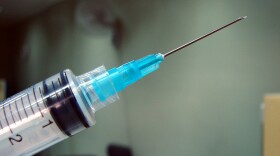Next week, Mountain Lake PBS in Plattsburgh will air the Independent Lens documentary “Love in the Time of Fentanyl,” which looks at a supervised drug consumption and safe injection site in Vancouver. In conjunction with the program the public television station in Plattsburgh hosted a panel discussion on addiction and services in Northern New York and what is being done to address the crisis.
Mountain Lake PBS screened the Independent Lens/PBS documentary before the panel discussion.
"We’re making the best of what we’ve got in the middle of a crisis situation where people are dying and we’re losing our friends."
The panel from across the North Country represented a variety of perspectives on the overdose crisis.
Malone Police Chief Chris Premo says the community is experiencing troubling trends in drug use and addiction.
“I’ve never seen it as bad as it is right now. We had 5 fatal overdoses of fentanyl in the last 4 weeks, one in the village, 4 outside the village. Completely unheard of in a small community like ours. We’re battling the drug epidemic and it seems like everywhere we turn there’s cocaine, cocaine, cocaine and sometimes cocaine laced with fentanyl. But I’ve never seen so much cocaine as there is now. I talked to one of my friends who is a detective in Plattsburgh and they’re seeing the same thing, lots and lots of cocaine. We’re actually starting to see some crystal meth, like the real crystal meth as well.”
The Alliance for Positive Health serves 15 counties in northeastern New York and focuses on harm-reduction. Program Manager Rheannon Croy says fentanyl is what typically shows up during their syringe exchanges.
“We don’t see very much heroin. We don’t see really any pharmaceutical prescribed medication pills. We’re really just seeing a lot of meth, a lot of cocaine, crack and typically it’s always laced with fentanyl.”
Overdose prevention sites are a controversial concept in the U.S., with two operating in New York City. The Champlain Valley Family Center provides substance abuse treatment, education and related support programs. Program Director Jared Croy says the problem is not safe injection sites, it’s the image conjured.
“It’s not really anything but people have a problem with people using drugs and if I can see it it’s a problem. I run a treatment program. But I also know that most of the people that come to my program will pick back up again. And we have accepted the fact that this is a very difficult thing to overcome. And instead of fighting against that fact we lean into it. And so it’s not about the safe injection site or harm reduction so much as it’s about are we being compassionate to people?”
Chief Premo does not support safe injection sites.
“Why can’t we have a methadone clinic, a suboxone clinic, case workers to help these people? And instead of everyday yup I’m going to go down to the clinic and get high today because I know I’m not going to overdose. I would want to get them the help first before I’d ever want them to go every day and shoot up. And where do the drugs come from? Where are they getting the money for their drugs? I think we can at least try to get them some type of help.”
MHAB is a life skills recovery center in Plattsburgh. Founder Michael Carpenter says he understands harm reduction but is not ready to support safe injection sites because of its complexities.
“If it’s safe injection sites are we opening up safe crack houses? What are we doing about the financial impact of the people who can’t necessarily work because OSHA hasn’t caught up with the laws that say we’re going to allow people to use drugs but we’re not going to allow them to work in manufacturing facilities? You have so many other problems that come into this that are really the stuff we need to be addressing if you’re going to do this.”
The panel discussion and documentary are part of a week of special programming on public television stations across New York next week that will focus on the overdose and addiction crisis.
Mountain Lake PBS will air highlights of the panel discussion tonight at 8.














